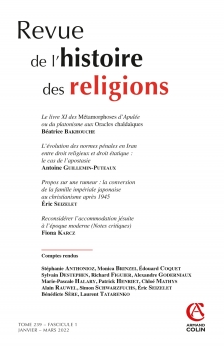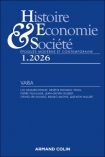
REVUE DE L'HISTOIRE DES RELIGIONS (1/2022)
Pour acheter ce numéro, contactez-nous
Recevez les numéros de l'année en cours et accédez à l'intégralité des articles en ligne.
L’article étudie les transformations du droit pénal en Iran depuis le début de sa confrontation avec des paradigmes juridiques issus du droit européen au xixe siècle. La particularité du droit pénal iranien réside dans les interactions du droit savant religieux (fiqh) qui s’est perpétué, avec le droit étatique réputé islamique à la suite de la révolution de 1979. En étudiant la notion d’apostasie dans le droit pénal iranien, l’auteur montre que les juristes religieux shi’ites continuent d’influencer les débats pénaux en Iran, quoiqu’ils soient relégués en périphérie du droit de la République islamique. Il montre aussi que les savants religieux actualisent le droit savant contemporain en matière pénale en confrontant leur tradition avec des principes juridiques étrangers au fiqh.
This article presents the evolution of criminal law in Iran since the 19th century, when the newly created domestic law began to incorporate legal paradigms developed in Europe. The specificity of Iranian criminal law lies in the interactions of the law of religious jurists (fiqh) – which endures to this day – with the supposedly Islamic criminal law enacted by the state since 1979. The study of the crime of apostasy exhibits that religious jurists still influence the debates on criminal matters in Iran although they sit on the margins of the domestic criminal system. The author shows that religious jurists continue updating religious law in the criminal realm by pronouncing on the status of legal principles foreign to their legal tradition.

